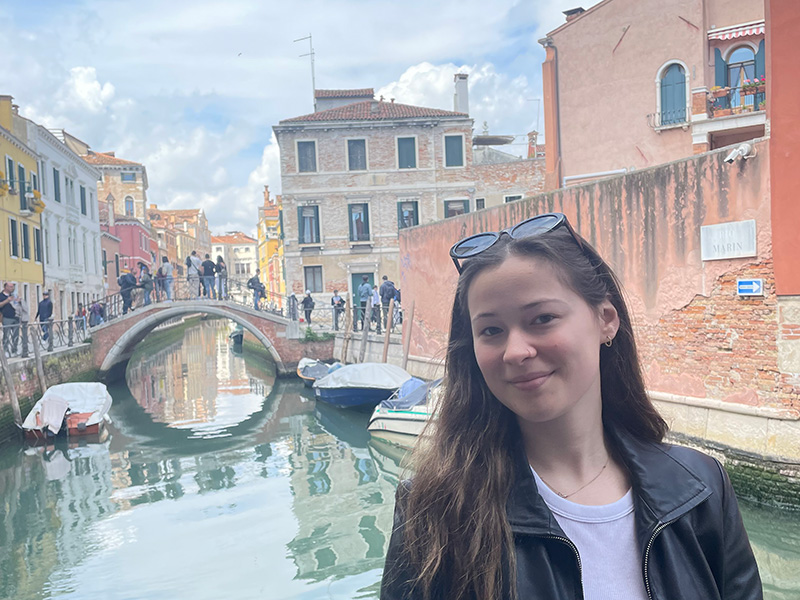Binghamton student proves education-abroad experiences are for nursing students
Caroline Portman explores Europe and gains independence, self-confidence and a love of travel

Caroline Portman did something unusual among her nursing school classmates at Binghamton University’s Decker College of Nursing and Health Sciences: She participated in an education-abroad experience.
“I’ve always pictured studying abroad as part of the college experience I wanted; I thought it was a once-in-a-lifetime experience that I shouldn’t pass up,” said the 20-year-old from Buffalo, N.Y., who just completed her second-year as a student in Decker’s traditional nursing program.
Many college students look forward to a semester studying away from their home country and consider it a fundamental part of their undergraduate experience. But for nursing students, a semester spent in an education-abroad program often seems incompatible due to the extensive academic and clinical requirements of Bachelor of Science in Nursing programs.
Consider this: Of the 207 Binghamton University undergraduates who took part in an education-abroad experience from summer 2022 to spring 2023, only two were from Decker College. However, the total number of Binghamton students seeking study abroad is unusually low in this post-pandemic timeframe, as SUNY didn’t reopen the program until spring 2022. Yet, numbers from the last typical academic year (2018-19) still show only 10 Decker College students out of 510 total students participated in an education-abroad program.
But Portman wasn’t willing to miss this educational-cultural opportunity: “Everyone I know who studies abroad recommends it, and I wanted to be able to experience living in a new place since I had not done so before.”
Portman spent the spring 2023 semester in Prague, studying at Charles University (the oldest and largest university in the Czech Republic) through SUNY’s Education Abroad program. She took four courses — psychology, gender and culture, photography and physical education — three of which helped her fulfill some General Education requirements at Binghamton.
Portman originally didn’t know where she wanted to study, so she compiled a list of SUNY Education Abroad programs in Europe and asked a well-traveled friend for his thoughts.
“Through his recommendation, I decided on Prague,” she said. “My family is part Czech, so I thought it would be cool to live where my ancestors did.”
Binghamton nursing students considering an education-abroad experience have a limited timeframe when it’s feasible to do so, since the nursing program has a rigorous curriculum that must be completed before the students’ junior year, when clinical experiences start. This leads to the common belief that nursing majors can’t fit education-abroad programs into their packed schedules.
Portman is happy to bust that myth.
“Since nursing has a semi-strict curriculum, some classes will have to be made up during other semesters,” she said. “For example, I would normally have had to take microbiology and anatomy and physiology II at Binghamton this spring, but since I was abroad, I took microbiology last fall and I’m taking A&P II this summer.”
According to Callie Frost, assistant director in Binghamton’s Office of International Education and Global Initiatives (IEGI), the University only requires that students spend their first year on campus. That means students may choose to study abroad anytime from the summer after their first year up until they graduate. According to IEGI’s records, spring and summer are the most common terms during which Binghamton students participate in education-abroad experiences.
“The best time for a student to go often depends on their academic program and degree requirements,” Frost said.
She added: “Where students are in their academic schedule can impact which programs are available to them. Some nursing students may wish to study in the winter or the summer so they can spend their fall and spring semesters at Binghamton taking their required nursing coursework. Other students may wish to rearrange their schedule so they can take a fall or a spring semester of general education and elective credits abroad.”
Cultural enrichment, personal growth
Education-abroad programs provide students with an opportunity to experience different cultures and perspectives, and to see the world and spend time in another country that many may not have the chance to do later in life. They also help students develop independence, confidence and adaptability, enhancing their personal growth.
Portman had previously been to only two countries outside the U.S., and this trip was the first time she traveled alone. She didn’t know anyone else in the program, which she admitted was “slightly nerve-racking,” but “mostly exciting.”
While in the Czech Republic, Portman lived in an international student dorm in the Prague 6 City District. She had her own room and shared a bathroom and common area with another student. All the students living in the dorm were participating in an education-abroad program.
“It was such a fun experience getting to meet people from across the U.S. and all over the world and hearing about where they live, how they grew up and their college experience,” she said. “Even with other students from the U.S., it is surprising to hear how different everyone’s lives are. I was very lucky to have amazing kids in my program that I became good friends with.”
Since Portman didn’t have classes on Thursdays or Fridays, she had a great deal of free time. Once a week she volunteered with a high school near the dorm, helping students prepare for their English language exams by critiquing their writing and oral presentations. This left her plenty of time to explore Prague.
“It’s a big city so I loved walking around and visiting the various shops, restaurants and other attractions,” she said. “My dorm was a 15-minute walk from the Prague Castle, so I liked exploring the neighborhood and its incredible views.”
Ample free time enabled Portman to also venture beyond the borders of the Czech Republic, taking weekend trips to Vienna, Budapest, Brussels, Venice and Madrid.
Her time exploring Europe has given Portman a bit of a travel bug.
“My experiences have definitely made me want to travel more,” she said. “There are still so many cities/countries that I want to visit and I feel like the travel experience and knowledge I’ve gotten recently will help me immensely on future trips.”
Portman’s advice for nursing students considering an education-abroad experience?
“Definitely try it!”
She added: “Nursing is a career in which you have to be adaptable, and I think studying abroad gives you a good opportunity to test this characteristic in yourself. Living in a completely new part of the world with a different culture than the one that you’ve been used to can be challenging, but I think the benefits of trying it will help you in your career as a nurse.”
Tips for students considering an education-abroad experience
- Start planning early! IEGI staff are happy to talk with students in their first semester or year at Binghamton to start the planning process. It’s never too early!
- Be open and flexible! There are about 1,000 program options available through SUNY, so there’s bound to be one that’s a great fit for what students are looking for. Staff in IEGI can help students narrow the choices. Being open to different locations or types of experiences will open up a world of possibilities.
- Apply for scholarships! Students may use their financial aid toward the costs of a Binghamton or SUNY program and there are scholarships specifically for students planning to study abroad. IEGI can help students search for scholarships and advise them on submitting competitive applications to national scholarships such as the Benjamin A. Gilman International Scholarship, which provides funding for Pell Grant recipients.
- Meet with your academic advisor! Students should be sure to speak with a professional advisor in their department/division (like Decker’s Division of Advising and Academic Excellence) about any plans to participate in an education-abroad program.
- Connect with financial aid! Students should also talk with staff in the Office of Financial Aid to be sure any aid received isn’t affected.


